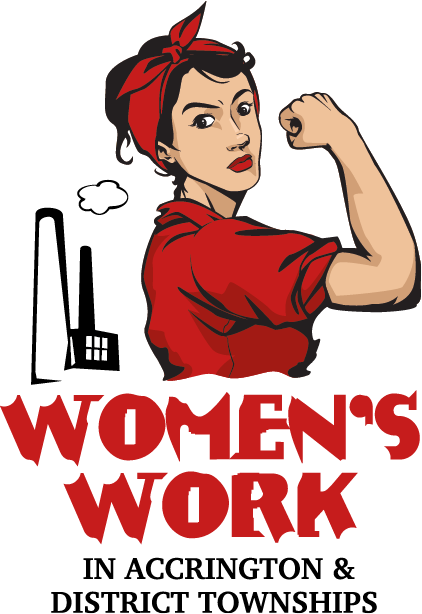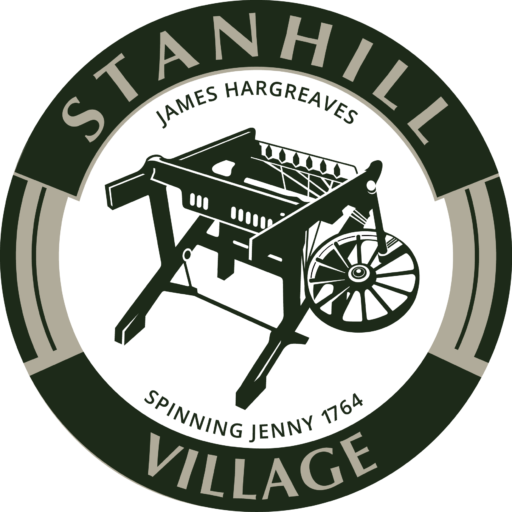Basically, there was just me and my sister and my mum. And my Mum worked, sometimes she worked 16-hour days. I had an absolutely brilliant childhood growing up and everything like that, never felt like I missed out on anything because my mum always made it special at weekends. Home cooked food… she took time out to well, to play games with us, and create things, ‘cos she were very creative, she could make things out of wood, I guess you’d call it whittling, but she just made everything. It were just a really happy childhood. I never missed out on my father not being there ‘cos as I told you before, my father was killed just before I were born. And we were always happy, always always happy. Didn’t realise that my mum was actually sacrificing, you know, because we thought we were quite well off, but my mum always made sure that we have the best of everything.
The biggest one (memory) that I can remember is when she worked at the brickworks and the site had just moved over to the Whinney Hill (Accrington Bricks) site at the time. I used to go to my nan’s who lived in Huncoat. My nan used to look after us, she wasn’t flesh and blood, she was just this elderly lady that my mum had known for years and years, and we called her nana. And she looked after us and we just used to walk down and go and meet her, or on the odd occasion, we’d be in, I’d be in there with her, sat on a little stool on her machine and watching her work. Which fascinated me, at that young age.
I were proud to say that me mum actually fired the first brick at Whinney Hill and she did all sorts of jobs and it was, basically a man’s world. My mum ran a machine. She climbed on hoppers and she did, mixed the clay with a stick, and moulded the bricks, took them down to the kilns, fired them, it’s things that trigger memories. If I smell oil, specially cat oil, it just brings all those memories back, I can smell the brickworks.
SCHOOL DAYS
There were some days I didn’t like it (school). I didn’t get on very well with a certain P.E. teacher. Until the end of the third year, we had a love-hate relationship. I couldn’t stand being in her company, probably because I was gobby you know, and I wouldn’t take it sitting down, but it was at the end of the third year that she actually came up to me and said, I think our feud’s gone on long enough, and from that moment on, we got on. But I think that was the only, I mean I liked P.E., I just didn’t like her. But as far as the rest of school were concerned, yeah I enjoyed meself at school. You know, I did the odd truancy, I think like most of them had bunked a day off school, but my favourite subjects were History and English. And I excelled in those two, mainly because of the interest in it.
CAREERS ADVICE AND FEMALE ROLE MODELS
Yes when I was in 6th form, we had extensive careers advice and we’d all sorts of sessions, you know like sessions, where they’d say, they’d show us things and I did know quite a few people, and we had a family friend and she was a lawyer. And all the television programmes that I’d watched, all lawyers were male. So, it was like I thought “wow” then, you know, a woman, and we had some, well, a relative of mine was head of their own business, which was quite unheard of in early 70s.
MUSIC WAS HER FIRST LOVE
My first love were, my main love, I wanted to be a successful singer in a band. And it was a dream I had from when I were a child. And I formed a band and we started going places, and then I just give it up, the dream died. (The band was called) B.S. Bandit, which stood for Big Soul Bandit.
Oh I was more interested in the music, so instead of going to college right away after I left 6th form, I went on to my band. Rehearsing, singing in pubs and clubs, and then like I said, the dream just died on me. I still liked to sing, but it’s not as good now, I’ve ruined my voice, blah blah blah, you know with smoking and whatnot.
Well it was a big pull because I thought I would live this dream, overnight sensation, get rich quick, but it doesn’t happen like that in reality.
MUM’S RESPONSE TO SHARON’S DREAM, SHARON’S FIRST JOB, WIGAN CASINO
She was happy with me. She allowed us to grow up, to make our own mistakes, to be there when we fell, and she encouraged me in that, but she also encouraged me to carry on with my education as well. For something to fall back on.
I was 18 when I left school. The first job, fully paid job was the work experience I did for 6-months at Tescos and my first wage was £23.50. Which probably wouldn’t buy you a bag of spuds and a loaf of bread nowadays. Most of my wage went towards travel to music venues, and buying records, music sheets for the group and everything, just that’s where the biggest part of my money went. I weren’t interested in the drinking side of anything at that time.
The places where I bought music, where I bought music sheets and everything, was Music Box on Abbey Street, or Reedy’s Music in Blackburn. Used to get a lot from there. Where I used to go and listen to music, well, it was like just going to local disco set ups, they weren’t real clubs or anything, they were just like community halls where they’d put weekend discos on, and whatnot. That’s where we listened to soul music, and where we used to go to venues. The only club that I actually went to, and I was underage, was Wigan Casino in my mate’s brother’s van. He used to take us all. And it was like, memories of that come flooding back, because we used to go to t’club, you know like, dressed casual, because it were like, we wanted to dance, that’s what you wanted, to dance, so it was no good with high heels and all make up on and everything, you just wanted to dance. And we had like, quilts in the back of t’van so that if we got tired, we could put our head down for a bit. Because it used to start at 8pm and it used to finish at 8am the following morning, so it was like all-nighters. But it was very rare I came outside to the van, because I were just buzzing off the music. And they were sort of like, I don’t know, it were just, part of my life that I wish I could relive, my youth, but I think that’s everybody’s dream, isn’t it?
Sticks in yer mind, it’s like, I call music my better memories, they can evoke more memories than any photograph, you know, just play a tune and I can remember exactly where I were when I first heard it, what I were doing, who I were with, goosebumps, hair raising.
ONE OF THE BOYS?
(I was) treated like one of them. It was like a month in each department, I worked in the prep. room which was preparing all the meats and everything, then you’d learn taking it from the bone, and all sorts right from doing that to labelling it up and putting it in the freezers.
I enjoyed it more in the warehouse, because that was taking deliveries, sorting them out in the warehouse, clearing the warehouse, just being in charge of stock upstairs. That was, it were good fun were that. But I’ve never been, I were never treated any different, you know, well the only difference being I was a newbie, so, you know, it was like teaching me how to do things but there was, I never felt uncomfortable.
(Sharon moved to work in a garage next.) The odd comment or two, you know, are you sure you know what you’re doing? Oh I can’t see a woman knowing how to take windscreen wipers off, which they were so easy.
And I tried to tell somebody that they were putting petrol in the oil pipe and that was the only real nasty answer I got was – What would you know, you’re just a woman! But you know, he had, he’d put petrol into his oil container, which it should have gone into the petrol side.
I just laughed. I laughed at it, because there was actually a gentleman in the, in the kiosk, that was trying to tell him the same and he backed me up, he said, the lady’s right, just look what you’re doing, you know. He just ignored both of us, drove off down the road and then I think his van, well I don’t think it broke down, I think it stopped because he needed petrol. But he didn’t come back to the garage to ring for the emergency services, he went right past. And I were just laughing. I just laughed every time I saw him.
SETTING UP HER OWN BUSINESS
A bunch of mates and we all liked doing one thing or another, where gardening were concerned, so we decided to form landscape gardening. And it, we got quite a bit done. We were working with a local housing firm, like mowing the grass, doing the gardens and everything, and then we had to fold because the lad, decided to disappear with all our tools and the van. So, and we couldn’t afford to replace them, so that was the end of it. About two years I did that.
We knew exactly where he went, he went down south. He was from down south anyway. And that’s where he disappeared to but apart from getting a detective on it, and everything like that, it were just one of life’s learning curves.
EQUAL PAY AND THE NIGHT SHIFT
I remember the big thing about equal pay, the big call out, because that was the only thing. I mean I used to discuss it with my mum, because that was the only thing my mum did what was termed a man’s job, but she was paid less, probably say, her weekly wage was roughly £20 less than what the man were getting. And sometimes the men weren’t doing as much as my mum. Or on the harder side. So I think I looked into that and that’s when I started looking at work rights and things.
In 1986 the restriction on women working night shifts in factories was lifted after the Sex Discrimination Act Amendment. In 1990 Sharon applied for a job on the night shift at Textile Mouldings (Temil). She spent 3.5 months on her own, in the vampire shift 10pm-6am before another woman joined her.
When I applied, went for the job, and got the job interview, they automatically presumed I’d gone for 6-2 or 2-10 shift, and I went no, I’ve come for nights. And obviously, I mean, they didn’t laugh or say anything, they said, Oh, right.
So I started on nights, and there had been a woman that had been on, but she only lasted a night and a half. So what I didn’t know was, they were actually monitoring me, to see how I got on, to see if anything happened, because they wanted to make it equal across the board. And it can’t be equal if there’s one lot that it’s just men only. So they wanted to see how I settled in, and I settled in right, and then, within 6 months of me working nights, my mate on 6-2 transferred to nights, and then women just started appearing left, right and centre. And it was a fairly 50/50 balance then. So I led the way sort of thing!
I moulded parts for cars, like the grille, the grille that’s at the front of Landrovers, that was one, wing mirrors, gear boxes, you name it. It was plastic mouldings, injection mouldings.
You have to have a good sense of humour, and you can’t go in thinking you’re Lady Muck or anything like that, because it’s so, night shift is so different from any other shift. It’s a lot more laid back because well, I think, mainly because there’s no senior management around, so, but you’ve got to be able to take a joke, you’ve got to be able to take the banter. Whether you were male or female, it doesn’t matter which end, you know, it’s a totally different outlook on nights, than it is on a day shift.
WORKING ALONGSIDE THE MEN
Well, it’s been construed as sexual harassment, with somebody just putting their arm around you. In some ways, I think, yeah this you know, sexual harassment at work, I mean I have never never experienced it myself, but I do know of people that have. But in the ways that they were experiencing it, and the ways that I saw, it was just friendly banter, there was nothing untoward, there were nothing sexual about it, it was just friendly banter, and an arm around somebody’s shoulder isn’t sexual harassment.
I mean we did have one, quality control, who, he actually thought he were a James Bond figure, you know, and he used to try to act so suave and sophisticated, and he made himself look a clown all the time anyway, but he’d pat your backside. But we’d just turn round and slap him when he did it.
So it’s like, we got our own back, it wasn’t, nothing was carried on. Although as union, whatever came out of union, there was one girl that took one of the bosses for sexual harassment, and it was, turned out, he wasn’t sexually harassing her. They’d been seeing each other for a few months, and then he suddenly said “look, it’s going nowhere,” and she was just a woman scorned, so she just said he was sexually harassing her but it took a long time, did that, to actually go through. Because obviously we’d to get information, you know, it couldn’t be just “she said it happened, he said it didn’t.” We had to investigate. But that’s what that turned out to be. She moved onto another shift, he stayed on nights, and I think they ended up getting back together again anyway. So it was like, I wasted all that paperwork for nothing! That’s how it was resolved in the end.
There’s a fine line, there’s a fine line that you can cross, and if you cross it, you’re going too far, and just a way of actually saying it, or there’s a slap across the chops, takes them back behind that fine line. But the cases that I’ve seen in the news, some of them are horrible.
And you are made to feel like that you should do that, or you won’t get anywhere. It’s like, do me a favour and I’ll do you a favour. And that sort of behaviour shouldn’t go on. But like I say, there’s a fine line, there’s a pat and there’s a pat. You know, like grabbing somebody and groping, well that’s sexual harassment. But just a friendly tap, these are days gone by. Today I don’t think they’d take it like that. There are far too many cases I think, that actually come, and they take them, to a tribunal, when it’s just been innocent banter. But it’s going to the tribunal that takes it further than what it should have gone.
WINNING AN UNFAIR DISMISSAL CASE
They brought in, it was, they’d sold, the company had sold, so they wanted a big shake up, so they brought in a management consultant team, and then they had these three managers, that knew nothing about plastics, which we’d told them you know.
And then it turned out, two of them were alright, but one, he wouldn’t even venture outside his office, and because I were union, he used to ask me, “what’s going on out there?” and the only time I answered him, were, “Well, it’s that time of year again, the dangling carrot, you know, ‘take this lower pay offer or you get nothing’ and it’s coming up to Christmas, people’d take it.”
I just said to him “If you really want to know, get out there and mingle with the people,” I says, “you’ll gain more respect that way.” but he wanted to see the back of me because I wouldn’t, I’ve never been a yes man and I wouldn’t bow down to him. And I wouldn’t tell tales, I wouldn’t do anything, and I argued with him.
I told him to get his fat arse out of his chair and get outside on that shop floor. And he threatened me, he said “I’ll see the back of you” and I wanted him to put it in writing and he wouldn’t. Then he says, he’d see me down the road, and I said, just say it in front of somebody so that I’ve got a witness, and he wouldn’t. I called him a chickenshit, but he did sack me. And I took them for unfair dismissal, and I won. He just wanted to see the back of me cos I couldn’t stand him. I didn’t like him at all, and I let him know that I didn’t like him.
What he wanted, he had a little team around him that was sort of like, bowing down, “yes, yes, yes, yes M—, I’ll be there”, you know. And I just weren’t, I’ve never bowed down, I’ve never done any creeping, you know, to get into positions that I’ve got into. I’m not going to start now, and I just told him, told him straight.
CHANGES IN THE WORKPLACE
Oh, I went back to Rists Wires for a stint, just before they folded, just went back there for a few months and then I got a job at another garage, a petrol site, I worked there as manager. And in that time, I worked bars, eventually becoming a relief steward in one of the local clubs to where I am now. I am a porter, on a market, on Accrington market.
Seventeen years, I’ve worked for the council, and I’ve seen a lot of changes, mainly the way people shop. Changes in the style of the market, changes in people’s attitudes. It used to have such a feel, such a caring atmosphere, years ago. Everybody looked out for each other. There just doesn’t seem to be that now. That’s the change in attitude I’ve seen. Not everybody, but it’s just that general feel. And it’s, how things that have been cut back, cut back. Shopping trends change, so you haven’t got the same people and the next generation coming up, they’re doing their shopping. Because the next generation are your online shoppers anyway.
There used to be, at one time, every single stall on the market, was full. And there was a waiting list of people to actually come on the market, to now, it’s like, I mean, you can’t go for this Covid at the moment, because it’s only essentials that are open, but to now, we’ve got about between 12 and 20 people on the outside (of the market) and no waiting list.
And it’s the workforce as well, I mean, we’re down to three full time porters and a part time, to where when we had that market like that, there were eleven porters. So that kind of change, we’re still expected to do the same amount of work, if you will. But there’s less people.
LOOKING BACK ON HER WORKING LIFE
I never really experienced any hardship or anything, if there was a position available, and I wanted to go for that position, I’d just apply. And I never got any knockbacks, I did say I were lucky.
But I still think it’s hard for women in the workforce. They’ve got to work twice as hard to prove themselves, especially when you’re going for a managerial position. It’s always seems to fall favourably on the male side. But even in my line of work now, I haven’t come across that. I have had equal opportunity to go for jobs, I’ve had interviews, it’s just somebody has been a little bit more qualified than me, so obviously you’re going to give it to somebody that’s more qualified.
There have been a couple of occasions when I’ve turned round, but it hasn’t been from my work colleagues, or anything. It’s more been outsiders, thinking “oh women shouldn’t be doing that, women should…” So I’ve turned round and said “oh yeah? I’ll do it.” And I have proved myself that way, but I’ve been lucky with the guys that I work with, they turn round and say, “there’s nothing to prove, you don’t need to prove anything. We know that you can do just as much as us, in fact, more.”
I don’t know (if she would choose the same path again). If I had the same feelings towards work, as I have today, no. Because I wanted to be hands-on. When I went to college, I actually wanted to go for the probation service, but then I didn’t like the idea of being sat behind a desk all the time. I wanted to be outside. I’d choose an easier job!
But I’m only saying that because of my age anyway. But no, this kind of job, it’s kept me fit, you know, I don’t go into work every day going “Oh I lurve being here!” You know, there are days when I think, come on, roll on six o’clock, I want to go home. But I do enjoy the job, because there’s no work and there’s no other job that I could get where I could have a gossip with people but still be doing my work. It’s like I’ve always had a team, or a, group of colleagues, we’re all doing the same. I’ve never been working alone if you will.
There’s always somebody to bounce back on or bounce off from. You know, always somebody there that backs you up. And I quite like that. We have a good comradeship amongst us as well. We back each other up, so I like that feeling.




